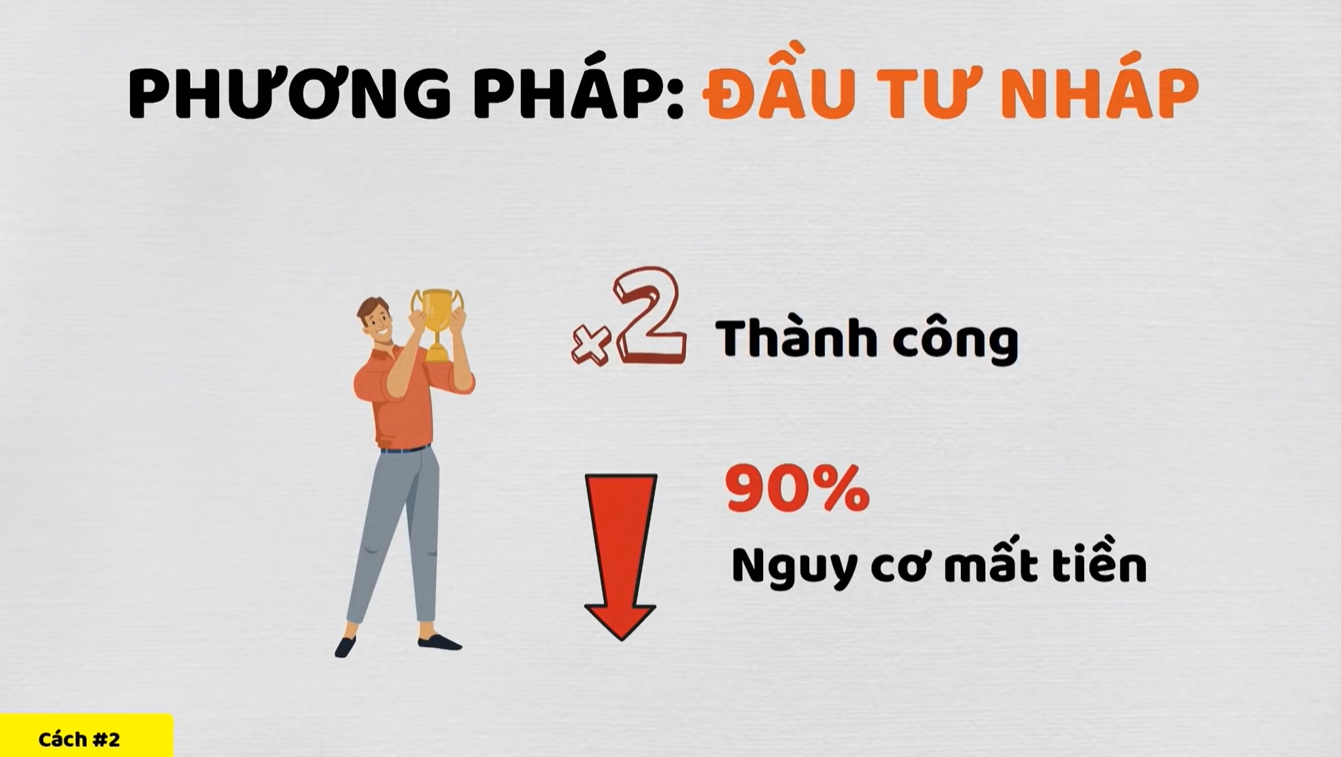It is about how to make sustainable money and securely hold onto your money. We use the term "financial safety," which means never losing safety due to lack of money or wrong decisions related to money, and in this article, I will show you three ways to ensure the situation for all of us here. Of course, on the condition that we must pay close attention, and even if there are useful things, you need to write them down, because human forgetfulness is terrible; sometimes you hear something and feel excited, happy, and then forget it the next day. Therefore, recording useful information or saving videos that we find helpful to listen to multiple times is very important.
When talking about financial safety, it is really hard to overlook issues like cash flow liquidity, marginal costs, P/E ratios, EPS, and so on, right? I'm just joking; I intentionally want to throw a smokescreen to make you dizzy with those high-level concepts, which you might not understand if you haven't studied economics. I'm just joking to wake up those who are feeling sleepy with concepts you might often hear, and I'm not lazy enough to create a financial article that just throws all the hard-to-understand terms at you. I will always explain and try to find the simplest, most common things to bring to you, even if they are complex topics.
1. Money is always easier to lose than to gain

In fact, the principle is very easy to understand; many famous investors around the world use it, and all those who are considered to have very high financial safety also always use this method. It is simple, and sometimes when you hear it, it sounds funny: “Money is always easier to lose than to gain.” So don’t take risks; you probably know this, right? Everyone knows it, but whether they understand it or apply it in life is the issue. Just this alone, many people fail, many people face hardships throughout their lives, not understanding this simple thing is very exhausting: “losing money is always easier than making money.” Whatever you do, you must remember this probability; this is a real probability in this life, a ratio that you can see all around you with your eyes closed.
The probability, the ratio of losing is always higher than winning in most aspects. Many people in society easily lose money, but gaining money is extremely difficult. Therefore, this first point, I sincerely and must plead with all of you to understand this very clearly. My first part will not help you live rich, but it helps you never die poor, and not dying poor is what matters, even more important than living rich, because once you die poor, there is no opportunity to become rich anymore. You go out into the world and keep hearing people say: “take risks to gain more,” right? But I ask you to use your logic: is it “take risks to gain more” or “take risks to lose more”?
Among many people playing a game or investing in something, is the majority winning or losing? How many people win and how many people lose? Is it taking risks to gain more or taking risks to lose more? It’s taking risks to lose more, even risking total loss. Don’t take risks; you must be cautious because money is easier to lose than to earn. One of the very reputable viewpoints I have from Adam Grant from a small study he conducted on entrepreneurs is that the result of this study shows that successful entrepreneurs are very afraid of losing money; they play very cautiously, not recklessly. They are very afraid of failure and value what they have in hand, so they do not take risks. We may look from the outside and see them doing big things, but they know what they are doing; they have reasons, they analyze, and they have ratios that they consider quite high before playing; they do not take risks.
So how do we avoid losing money easily? That is, if you don’t know, don’t play. Our ancestors said, “If you don’t know, lean against a pole and listen,” right? But in the field of money, if you don’t know, don’t play, because there is no risk higher than the risk of ignorance. At most, you might get lucky and fall into a small winning group, but when we talk about probabilities, which one is greater? The one that is significantly greater than the other is the loss, right?
2. The draft investment method

In this second way, I will show you how to double your chances of success in making money and reduce the risk of losing money by 90%. When we can double our chances of winning and reduce our chances of losing by 90% at the same time, it is quite safe; it is no longer a gamble. Of course, there must be some risks, but we reduce the risks. It’s not that you have to play all your money, as that can lead to significant losses. I call this the draft investment method.
For me, draft investing is one of the most important ways to help me play a game very safely, and even if I have illusions, this method will erase all my illusions and bring me back to reality without harming or hurting myself. What is draft investing? You just need a piece of paper; now, if you want to invest in something, don’t put your money in yet; write down your predictions on your paper first. For example, in stocks, right? If you want to buy a certain stock code, write it down on your paper, write the current price in the next column, then in the third column, write the price I predict after one month, and in the fourth column, write the explanation of why I predict the price will increase by how much after one month?
Write down these predictions to look back after a week or a month to see if your predictions were correct. Secondly, the reasons you believe it will go up or down, are they reasonable? Don’t be afraid of missing opportunities; there are plenty of opportunities. We are playing for the long term, so don’t be afraid that if I write my predictions on paper, I will miss the opportunity to make money after 1, 2, or 3 months. Are you only planning to play for 3 months? No! You draft invest on this piece of paper to see if your predictions are right or wrong, to have the preparation to play long-term. You should play for 5 years, 10 years; otherwise, why play for a few months and then quit?
After a month, if you find out that you were wrong in 8 or 9 predictions, then at this point, I hope you can see the reality of your true abilities; you are not yet skilled enough to play this game, so learn. The draft investment method is very correct; it is very useful for those who are considered to lack the skills for the investment game because you know you are wrong too much, but you haven’t lost money, and you don’t have to pay the price for your mistakes because it’s draft investing. So I continue to learn, improve my predictions. After I get it right time and time again, and especially analyze why I was right, then I will play; it’s that simple, and be cautious. The principle is “don’t lose money.” Many people say you have to put some money in to feel the game; I find that unnecessary. If you have already determined that your initial skills are limited, then why put money in to lose it? The most important thing in this game is not necessarily whether the price goes up or down, but your ability to know whether it will go up or down. Your ability to assess the market, your deep insights are the most valuable. You need to see opportunities and risks; that is your greatest asset. So when you participate in investing, you must sharpen that first; if you don’t have that, how can you win?
3. Learn about finance

At the beginning of the article, I mentioned a few concepts, a few keywords: cash flow, marginal costs, P/E ratios, EPS, and so on, right? Even if you dig deeper, there are many complex equations of these indicators. I say this because I genuinely want you to understand those numbers. As long as you are using money, as long as you are holding money in your hands, you should know about finance. Now, I’ll put it simply: if you determine that you don’t need to know, then the most suitable thing is that we should stop using money; we can retreat somewhere to live off the grid, self-sufficient, then those are the only people I believe don’t need to know about money.
But once you are holding money, you have a bank account, and your life still heavily depends on money, you cannot live without money, then you must know about finance, at least the basics. For example, you must see the relationship between interest rates, inflation, gold prices, and foreign exchange rates; those are very easy things. Just learning the basics, you will see, but when an event occurs in life, you should at least know at a basic level, the rule that money will depreciate, money will lose value, the future will be difficult, or the future will be favorable; you must know. These are very broad issues; I cannot just pull out hundreds or thousands of examples to tell you. What you need are the root knowledge so that you can see those things. Therefore, the third thing for financial safety is something that is both easy and difficult: learn about finance.
